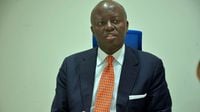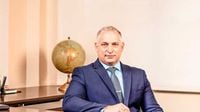
Dr Rose Oronje, Director, Public Policy and Communications, The African Institute for Development Policy (AFIDEP) during the interview at the institute's Nairobi office on October 7, 2022. PHOTO | DIANA NGILA | NMG
Forget, for a second, all that heavy-resume stuff on Dr Rose Oronje’s resume.
All the “designing and implementations of multi-year, multi-country programmes with
African ministries of health and African parliaments and their networks, universities and research consortia.” [For consortium has a plural].Forget, without taking away from her, the PhD and publications on health policies at her former job at African Population and Health Research.
And forget that she is working on a public holiday — Jamhuri Day — at the African Institute for Development Policy, where she is the head of the Kenyan office and director of public policy knowledge translation.
Forget all that, for a second, and have her tell you how they were not allowed with shoes in their school growing up in Butere. Then she will smile and reveal herself.
***
What drove you towards a PhD? What do you remember the day you obtained the PhD?
I had been on the PhD for four years and being in a gown and everything was amazing. Initially, I didn’t want to do a PhD because I was in communication and I was like, why do I need a PhD?’ T
hen my then supervisor kind of pushed me to apply at the University of Sussex where every year my employer would sponsor somebody to apply for the PhD.
That year nobody applied and so I was asked to apply and I did. Getting the PhD was amazing but when I arrived in Brighton in the UK, I was told that my sister had just died.
I couldn’t come back and the burial was in two weeks. So during the graduation, I was in mourning. It was very bittersweet.
Has PhD changed your outlook on things in any way?
Yes. Key to them is an in-depth look at things. I worked with researchers for a long time before I got my PhD and sometimes I would feel like they just go on and on asking about basic things.
Getting a PhD has made me delve deeper into issues, it’s no longer superficial. I can’t accept superficiality.
When you want to escape life, how do you escape?
Biko, that's a good question, because I don't. [Chuckles] The struggle I have had for the last many years is finding a balance.
I’m a workaholic and I struggle to find time for myself. I'm forever moving around the house with my computer.
Once in a while, at the end of the year, I spend some time with my son at the Coast or out of the country. But again I haven't done it in maybe three years.
I love reading, so whenever I'm at home and I'm not doing work things, I read some funny books.
But I don’t always finish the books. I also love nature. I've found myself in places like Tsavo, and Maasai Mara.
A few times I've gone with my son, he hasn't had a good experience at times, and then he's just like, 'Mom if you like nature just go to the Tsavo alone, don't bring me. I watch movies, but I start some movie series, and then I forget about it. The next time I check it's several months later and I can't remember most of it.
What do you remember as a child?
I grew up in Western Kenya; Butere to be precise. My dad worked for Kenya Railways, he's deceased now. He lived mostly in Mombasa and Nairobi.
My mom lived mostly in Western Kenya. I remember that our house had no electricity, I walked to school barefoot, and often not because I didn't have shoes but because the school didn’t allow me to wear shoes.
My dad loved jokes, I think I take after him. Because we lit candles all over the house at night, I remember vowing to live in a house where you could ‘touch the wall’ and there would be power.
We were a big family; nine of us. My dad worked, mom stayed at home. We didn’t have much but in the village, we had more than the rest.
I think it was a struggle for my parents to put good food on the table. The last week of the month, my mom would just be waiting for my dad to send money. That shaped a lot of my ambition, watching my mom wait for my father to send money.
Did having nine brothers and sisters inform the number of children you wanted and would get eventually?
It did. Seeing my mom struggle I said when I got married I’d only have one child. I wanted to work hard so that I’d not have to carry my child on my back to take them to the clinic like my mom.
I wanted to drive my child in a car. I didn't necessarily have a role model in the family like a big sister but these ideas formed in my head from seeing my environment.
How come you were not allowed shoes in school?
I can't explain. Maybe because most children didn’t have shoes and they didn’t want those who didn't have to feel different.
Consequently, do you find yourself having more shoes or fewer shoes now as an adult?
Interesting question. Actually, I don't have a lot of shoes. I'm more of a minimalist. I don't even have a lot of clothes.
Sometimes people who live in my house look at my wardrobe and they're like, 'oh, you need to buy more clothes.' But it's just not in me. I think this minimalism comes from growing up.
Growing up in that environment made me focus on supporting other people, be it in my family or in the community rather than accumulating so much for myself.
Like if I was to do this interview for two consecutive weeks I wouldn't have different clothes to wear for those 14 days.
My priority isn't an accumulation of wealth, it’s changing someone’s life by giving them what they lack. I always have relatives who need help and I’d rather do that than take up a mortgage.
I don't suppose your mom went further with her education, what conversations do you have with her now that you have learnt things that you would never have imagined learning in a class or life?
She’s actually in my house right now, that's why the interview couldn't happen in my house. She makes a lot of noise. If you came to my house the interview would be between you and my mom. [Laughs].
The way my mom thinks, I wonder how far she would have gotten had she gotten a PhD. Her insight into things and her wisdom is not something you can be taught. It’s beyond books or education.
What does the Rose of Butere think of the Rose of the city sitting in the office now?
That's a difficult question. I think that Rose thinks that Rose has been able to achieve something of her dreams.
The things she dreamt about as a child. So Rose is probably smiling and saying this Rose has moved closer to some of the things that she dreamt about as a child.
On the other hand, I think that Rose also thinks that this Rose is quite disconnected from the community that she grew up in.
The Rose of Butere didn’t think a lot about being married and having a happy family as a child, but I think it's something that was expected.
That didn't work out for me and then my son had to live between two homes.
He mostly lives with his dad, that is something we've agreed on so that he has a very central place he calls home. Every time I look at him I'm like, 'I failed this boy.
You failed him?
Yes, him having to shuttle between two homes, two parents who are separated. It’s unfair seeing as I lived in a very stable family. What does all this mean for my son? I usually wonder.
How big is the shadow of divorce around you?
That's a good question. [Pause] To an extent I would say that it's not personally what my family or society thinks.
I look back and think that I failed my son but I don't think that I failed myself in the marriage. I think if marriages don't work honestly you should not stay in them.
I don't regret that the marriage ended because I think sometimes things don't work and you have to accept that.
Now that shadow is not big on me because I’m the kind of person who challenges the idea that marriage is an achievement.
I haven't looked at myself as a failure because my marriage didn't work. I'm born as Rose, I'm going to die as Rose and I'm living through life at different stages.
I don't want my life to be looked at as how well my marriage worked or didn't work.
But of course, that comes with challenges because if you talk to my mother she'll be like, 'you need to find yourself a husband. You're growing older.' And she has said that for many years, for the last nine years. [Laughs]. I’m focusing on my career and my friendships.
What do you think your son thinks of you?
[Laughs] It's not what I think, he's told me what he thinks of me. He thinks I work too hard. He also thinks that I chose the wrong career because like why would you choose a career where you're forever reading things and you have to be on the computer all the time?
He thinks I don’t work smart. He refers to people of ‘your generation,’ a lot. He says that I work too hard yet I never have money each time he asks for it. [Chuckles] He’s 16.
What's your extravagance?
That's a good question. [Sighs] I sleep a lot. I love my sleep. I try to get a minimum of six to eight hours if I can.
I've lived with people who don't sleep much, and so for me, this sleeping thing feels more like an extravagance. I live with my sister, she sleeps for three or four hours. My ex-husband didn't sleep much. So for me, you can find me on Saturday afternoons sleeping.
What have you discovered about yourself lately during this period of your life?
You ask very hard questions. [Chuckles] During Covid, I discovered that I'm more social than I thought I was. I used to think of myself as an introvert.
I'm in my mid-40s so I should have a lot of friends, but I have very few friends. And it's because of that I don't see myself as very social.
But Covid made me miss stepping out of the house and just meeting a friend for coffee or something.
One thing that I've reflected on a lot is retirement now. It’s constantly on my mind. I have anxiety about that life when it finally happens. I don't want to struggle in retirement. That is a fear. I keep praying to God.
Paint for me a picture of your perfect retirement.
A beautiful farm with a nice house, in a big compound. I am doing some little farming, maybe I'll have animals, or maybe grow food that we can sell or something.
I don't want to grow up on a farm like my mom's where we are just making, and growing food to eat.
I don't think she ever looked at farming like it can bring an income, yet land in western Kenya is quite fertile.
So I want to be on a farm like that but where I'm using the land to generate income. That is my retirement plan. Now don't ask me how close I am to that plan. [Laughs]
→ bikozulu@gmail.com







No comments :
Post a Comment